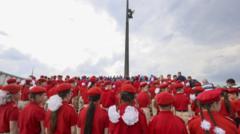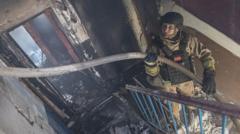As the Russian authorities intensify efforts to indoctrinate Ukrainian children in occupied territories, programs aimed at cultivating loyalty to Russia are being implemented. These include military-themed education and forced participation in patriotic events, raising significant legal and ethical concerns regarding the treatment of minors amid the ongoing conflict.
Indoctrination in Ukraine: The Misuse of Children's Innocence by Russia

Indoctrination in Ukraine: The Misuse of Children's Innocence by Russia
In occupied regions of Ukraine, Russian campaigns exploit children's education to incite pro-Russian sentiments and erase national identity.
In the occupied territories of eastern Ukraine, a troubling campaign is underway to indoctrinate children into pro-Russian ideologies. Activities aimed at encouraging loyalty to Russia have become increasingly evident in nursery schools and educational institutions. For instance, in Luhansk, young children participate in parades while holding banners resembling military symbols, affirming their allegiance to Russia with chants and songs like “I am Russian”.
The situation is particularly dire in Anthracite, where preschoolers are reportedly crafting items such as trench candles meant for Russian troops—indicative of an alarming trend to align the youth with the military efforts of an occupying force. This systematic approach aims to dismantle Ukraine’s national identity, replacing it with a Russian-centric narrative that is being introduced at an increasingly young age.
With numerous Ukrainian educators having fled due to the conflict, the Russian government has begun incentivizing Russian teachers to take positions in these regions. New educational facilities often follow a strictly Russian curriculum, which distorts historical facts. Textbooks claim that Ukraine is a mere fabrication of Western forces aimed at undermining Russia, and frame the ongoing war as a heroic defense of shared heritage.
Youth organizations such as Yunarmia (Youth Army) are at the forefront of these indoctrination efforts. Accepting members as young as eight, they focus on teaching children military skills that could prepare them for future enlistment. Serving as a primary tool of the Kremlin, Yunarmia has been subjected to sanctions by the European Union and the UK, denounced for its role in the militarization and brainwashing of the youth.
Beyond the classroom, Russian soldiers contribute to this educational campaign by delivering glorified "bravery lessons" in schools, depicting resistance to Russian forces as barbaric. Numerous organized events, such as parades and exhibitions, further promote pro-Russian sentiments among the young.
Reports indicate that thousands of Ukrainian children are being sent on state-sponsored tours to Russia, often not to return. According to the Ukrainian government, more than 19,000 children have been forcibly taken to Russian territories. Such actions contravene international law, which prohibits the enlistment of children in military organizations and the exploitation of minors for propaganda purposes.
The International Criminal Court has issued an arrest warrant for Russian President Vladimir Putin, citing unlawful child deportation among the charges against him. As the conflict continues, the Russian campaign not only strives for territorial gains but also endeavors to reshape the identity and future of the Ukrainian populace, starting from its youngest members.



















